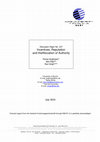Papers by Ravi Ranjan Singh

We address the question how much authority a principal should delegate to a manager with conflict... more We address the question how much authority a principal should delegate to a manager with conflicting interests and uncertain ability in a context in which the manager has both compensationbased and reputational incentives. The optimal level of authority balances the value of the manager's decision-making expertise against the cost of ensuring that the manager uses his discretion productively. Reputational incentives reduce the necessary monetary incentives to discourage purely opportunistic behavior, but may cause the manager to pursue conservative courses of action to preserve his reputation. This undermines the benefits of delegating control, leading to decreased managerial authority and stronger monetary incentives. When the principal can commit to long-term contracts, she eliminates this conservative bias by rewarding a successful manager with greater future compensation and authority than would be optimal in a static setting. Early in the relationship the principal may delegate additional authority in order to screen for managers of high ability.

Academia Letters, 2021
A director is "bound to take such precautions and show such diligence in their office as a pruden... more A director is "bound to take such precautions and show such diligence in their office as a prudent man of business would exercise in the management of his own affairs."[1] This may be considered very old but it still holds lots of relevancy. Those days are gone where certain family-owned companies referred to themselves as industry monopolies when doing everything they pleased to disgrace Corporate Authority and integrity to the fullest degree conceivable. Shareholders of the new era are more mindful of their duties than ever before and more influential than anybody can fathom. Through the Shareholders Revolt, corporate governance becomes a democracy, with shareholders as the supreme force nominating the department in the form of directors to run the show and gain them financial benefit. The Directors are entrusted with appropriate authority but also with expanded liability as a result of this process. The Companies Act 2013 has guaranteed that this balancing of power and duties is upheld to the greatest degree possible for the good of shareholders and to ensure effective corporate governance. It implements both administrative and disciplinary steps, including strict judicial measures, to ensure that laws are enforced properly, to prevent corporate governance mishaps, and to protect the organization's legal sanctity. Let us discuss the particular features of this modern age of corporate governance and increase awareness of the Directors' roles.






Uploads
Papers by Ravi Ranjan Singh